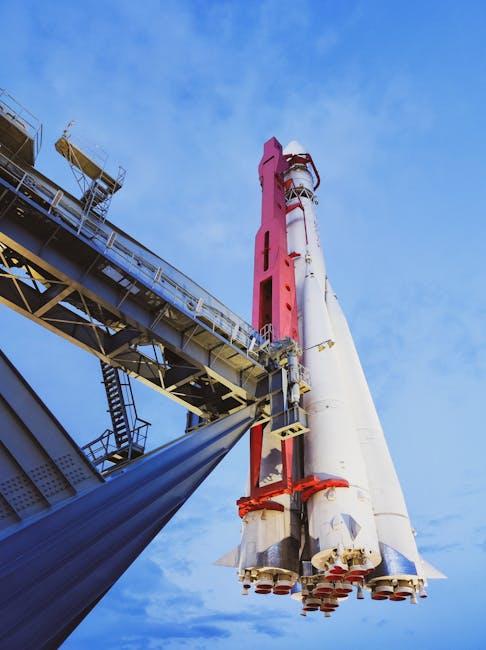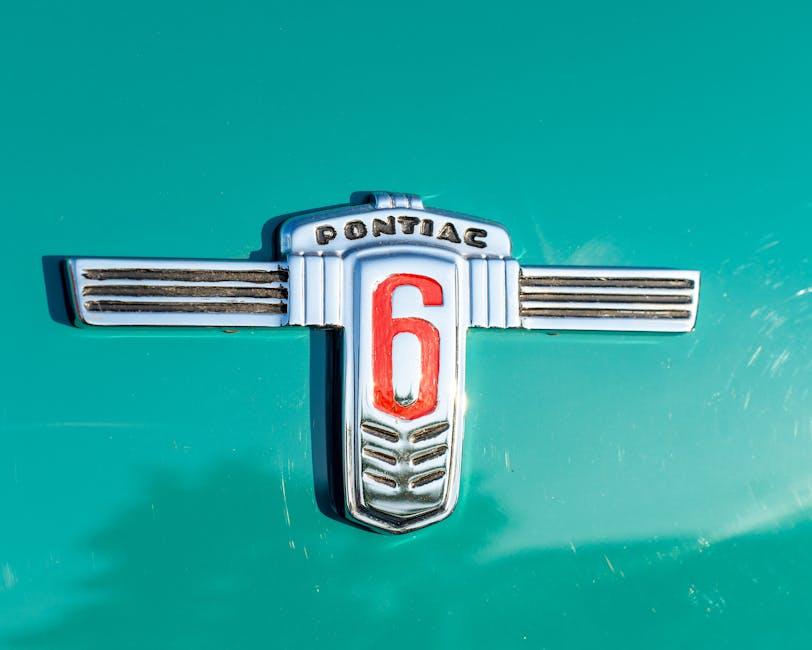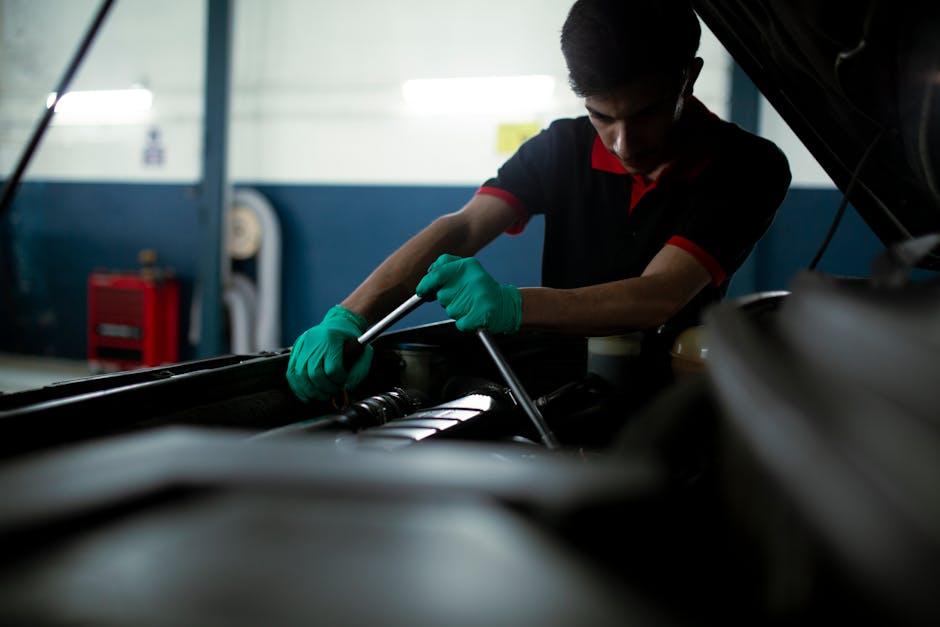Beneath the familiar hum of a running engine lies a subtle, unsettling rhythm—an irregular tapping known as engine knocking. This phenomenon, often dismissed as a mere nuisance, can be a warning sign of deeper issues within your vehicle’s mechanics. But what exactly causes engine knocking? Is it a simple misfire or a symptom of something more complex? In this article, we’ll delve into the science behind the knock, exploring the factors that lead to this metallic percussion and what it means for your engine’s health. Whether you’re a casual driver or an auto enthusiast, understanding the origins of engine knocking can help you take better care of your car and keep it running smoothly.
Table of Contents
- Understanding the Science Behind Engine Knocking
- Common Factors That Trigger Engine Knocking
- The Role of Fuel Quality and Octane Ratings
- How Engine Design Influences Knocking Susceptibility
- Diagnosing Engine Knocking Through Sound and Performance
- Effective Strategies to Prevent and Fix Engine Knocking
- Q&A
- In Summary

Understanding the Science Behind Engine Knocking
At its core, this phenomenon occurs when fuel combusts unevenly inside the engine’s cylinders. Instead of igniting smoothly, pockets of air and fuel mixture explode spontaneously, causing a sharp, metallic knocking sound. This irregular combustion generates excessive pressure waves that reverberate through the engine, potentially damaging vital components over time. The process is influenced by factors such as fuel octane rating, combustion chamber design, and engine temperature, each playing a crucial role in how evenly and efficiently the fuel burns.
Several key contributors to this condition include:
- Low-octane fuel: Less resistant to premature ignition.
- Carbon deposits: Increase compression and create hot spots.
- Incorrect ignition timing: Causes fuel to ignite too early or late.
Understanding these elements helps engineers and drivers alike maintain engine health and optimize performance. The table below summarizes the primary causes with their effects:
| Cause | Effect on Engine |
|---|---|
| Low-octane fuel | Premature ignition and knocking |
| Carbon buildup | Hot spots raising combustion temperature |
| Faulty ignition timing | Irregular combustion and pressure spikes |

Common Factors That Trigger Engine Knocking
Engine knocking often roots from a combination of mechanical and fuel-related inconsistencies. One primary culprit is the use of low-octane fuel, which lacks the necessary resistance to premature combustion. When fuel ignites unevenly, it causes those characteristic metallic taps inside the cylinder. Another frequent trigger is incorrect ignition timing—if the spark fires too early or too late, the pressure builds against the piston at the wrong moment, generating the knocking noise.
Besides fuel and timing, several other factors can stealthily introduce knocking vibrations:
- Carbon deposits: Buildup inside the combustion chamber can raise compression, leading to uneven combustion.
- Overheating: Excessive engine temperatures increase the chance of spontaneous fuel ignition.
- Poor air-fuel mixture: Lean mixtures tend to burn hotter, amplifying knocking risk.
- Faulty spark plugs: Worn or misfiring plugs disrupt precise ignition timing.
| Factor | How It Contributes |
|---|---|
| Low-Octane Fuel | Premature ignition, inconsistent burn |
| Incorrect Ignition Timing | Pressure spike at wrong time |
| Carbon Deposits | Raises compression, uneven burning |
| Engine Overheat | Promotes spontaneous combustion |

The Role of Fuel Quality and Octane Ratings
High-quality fuel is much more than just a liquid that powers your car; it plays a pivotal role in preventing engine knocking. Low-grade fuels often contain impurities and inadequate additive packages, which can ignite prematurely in the combustion chamber. This early ignition leads to the characteristic knocking sound that signifies abnormal combustion. Choosing fuels with proper formulations reduces the risk of these explosive, uncontrolled fuel burns by ensuring that the fuel burns at the right time and rate.
Octane ratings serve as a critical benchmark for fuel performance, representing the fuel’s ability to resist knocking. The higher the octane number, the more compression the fuel can withstand before detonating. Modern engines, designed with higher compression ratios, typically require premium fuels with higher octane ratings to maintain smooth and efficient operation. Below is a quick reference table illustrating typical octane ratings and their recommended engine types:
| Octane Rating | Engine Type | Fuel Characteristics |
|---|---|---|
| 87 (Regular) | Low to mid compression engines | Standard resistance, widely available |
| 89 (Mid-grade) | Moderate performance engines | Better knock resistance, slight performance boost |
| 91-93 (Premium) | High compression/sports engines | High resistance to knocking, supports tuning |
Using the correct octane fuel aligns with your engine’s design specs, optimizing combustion timing and minimizing peak pressure spikes responsible for knocking. In essence, both the quality and octane rating of your fuel act as frontline defenses, shielding your engine from premature detonation and promoting longer engine life and better efficiency.

How Engine Design Influences Knocking Susceptibility
Modern engines are intricately designed to manage the precise timing and environment in which fuel combustion occurs. Factors such as compression ratio, combustion chamber shape, and spark plug location directly affect how likely an engine is to experience knocking. Higher compression ratios increase the temperature and pressure of the air-fuel mixture, making it more prone to auto-ignition if not carefully controlled. Meanwhile, the shape and size of the combustion chamber influence the flame front’s propagation, impacting whether combustion is smooth or disrupted by premature ignition spots.
Moreover, the ignition system design and fuel delivery method play critical roles in minimizing knocking. Engines equipped with advanced ignition timing controls and direct fuel injection systems can better manage combustion dynamics by precisely controlling when and how the fuel-air mixture ignites. Below is a brief overview of some key design factors and their typical effects on knocking susceptibility:
| Design Factor | Effect on Knocking |
|---|---|
| Compression Ratio | Higher ratios increase knocking risk but improve efficiency |
| Combustion Chamber Shape | Complex shapes promote better flame control, reducing knock |
| Spark Plug Location | Central placement ensures uniform combustion and less knock |
| Fuel Injection Type | Direct injection allows precise fuel timing, lowering knock risk |
| Ignition Timing Control | Advanced control systems optimize spark timing to avoid knock |

Diagnosing Engine Knocking Through Sound and Performance
One of the first signs of engine knocking is a distinct, irregular metallic rattling sound coming from the engine bay. This clattering noise, often compared to marbles rattling inside a can, usually becomes more pronounced during acceleration or when the engine is under load. To detect knocking accurately, listen closely when the engine is warm, as cold starts rarely produce this sound. Pay attention to any hesitation, reduced power, or unusual vibrations, as these are performance indicators that accompany the knocking noise and signal a combustion issue within the cylinder.
Understanding how knocking affects your vehicle’s performance can help diagnose problems early. Here’s what to observe:
- Loss of acceleration: The engine may struggle to gain speed smoothly.
- Increased fuel consumption: Knocking can disrupt combustion efficiency.
- Engine vibration: A harsh shake or jitter can be felt during acceleration.
| Symptom | What it Means | Possible Cause |
|---|---|---|
| Rattling noise | Premature combustion | Low octane fuel |
| Power loss | Engine hesitation | Incorrect ignition timing |
| Excessive vibration | Uneven cylinder firing | Carbon buildup |

Effective Strategies to Prevent and Fix Engine Knocking
Maintaining the health of your engine requires a proactive approach to prevent knocking, which is often caused by premature ignition in the combustion chamber. One effective way to avoid this issue is by using high-quality fuel with the proper octane rating recommended by your vehicle’s manufacturer. Low-octane fuel can ignite too soon under pressure, leading to knock, so always prioritize fuel suited for your car’s engine. Additionally, regularly inspecting and replacing spark plugs, as well as ensuring timely oil changes, can keep your engine running smoothly by promoting efficient combustion and minimizing deposits that trigger knocking.
When engine knocking is detected, prompt corrective measures can save costly repairs and extend engine life. Consider the following strategies:
- Adjusting ignition timing to ensure sparks fire at the optimal moment in the combustion cycle.
- Cleaning or replacing fuel injectors to maintain proper fuel flow and prevent lean mixtures prone to knocking.
- Using fuel additives designed to enhance combustion and deter detonation.
- Inspecting engine sensors such as the knock sensor or oxygen sensor, which help regulate engine timing and air-fuel ratios.
| Strategy | Benefit |
|---|---|
| High-Octane Fuel | Prevents early ignition and soft knocking |
| Ignition Timing Adjustment | Reduces engine stress and optimizes combustion |
| Fuel Injector Maintenance | Ensures efficient fuel delivery |
| Sensor Checks | Detects and corrects engine timing issues |
Q&A
Q: What exactly is engine knocking?
A: Engine knocking, often called “pinging” or “detonation,” is the sound you hear when fuel in the engine’s cylinder ignites unevenly or prematurely. Instead of a smooth, controlled burn, the fuel-air mixture combusts erratically, causing a knocking or rattling noise.
Q: Why does this knocking happen inside the engine?
A: Normally, spark plugs ignite the fuel mixture at just the right moment. Knocking occurs when pockets of fuel ignite before the spark plug fires, creating shock waves inside the combustion chamber. This premature ignition can happen due to high pressure and temperature conditions that push the fuel to explode too soon.
Q: Is the type of fuel a factor in causing engine knocking?
A: Absolutely. Using fuel with a lower octane rating than what your engine requires can promote knocking. Higher octane fuel is more resistant to premature ignition, meaning it can withstand greater pressure before detonating, which helps keep knocking at bay.
Q: Can engine temperature influence knocking?
A: Yes, high engine temperatures can increase the likelihood of knocking. When the engine runs hotter than usual, it raises the temperature inside the combustion chamber, making it easier for fuel to ignite too early.
Q: Are there mechanical issues that contribute to engine knocking?
A: Definitely. Problems such as carbon buildup on pistons, incorrect ignition timing, or a malfunctioning EGR (Exhaust Gas Recirculation) valve can upset the combustion process. These issues change the conditions inside the cylinder, encouraging knocking.
Q: Does engine knocking cause damage?
A: Persistent knocking can damage engine components, such as pistons, valves, or cylinder walls, due to the abnormal pressure fluctuations. Over time, ignoring knocking can lead to reduced performance and costly repairs.
Q: How can knocking be prevented or fixed?
A: Preventing knocking involves ensuring you use the correct octane fuel, maintaining proper ignition timing, and keeping the engine clean and cool. If knocking occurs, a mechanic can diagnose the cause—whether it’s an adjustment, cleaning carbon deposits, or repairing faulty parts.
Q: Is occasional mild knocking a serious concern?
A: Occasional mild knocking might not be immediately harmful, but it shouldn’t be ignored. Regular knocking signals that the engine’s combustion isn’t functioning optimally and could develop into more serious problems if left unresolved.
This Q&A uncovers the cascade of factors that can turn a smooth-running engine into a noisy, knocking machine, reminding us that the dance of combustion demands careful choreography.
In Summary
In the intricate symphony of your engine’s operation, knocking is the discordant note that signals trouble beneath the surface. Understanding what causes engine knocking not only helps in diagnosing potential issues but also empowers you to take proactive steps toward smoother, more efficient performance. Whether it’s the quality of your fuel, ignition timing, or internal mechanical factors, each element plays a crucial role in maintaining harmony under the hood. By paying attention to these signals and addressing them promptly, you ensure your engine runs with the steady rhythm it was designed for—turning potential problems into opportunities for better care and longevity.


683 Comments
https://shorturl.fm/GeSli
https://shorturl.fm/pZYSX
https://shorturl.fm/aCSoz
https://shorturl.fm/07zPN
https://shorturl.fm/yyIrt
https://shorturl.fm/D2Ei0
https://shorturl.fm/roCfh
https://shorturl.fm/VjSUP
3b047t
https://shorturl.fm/JkzP4
https://shorturl.fm/vPqKF
https://shorturl.fm/9VXKx
https://shorturl.fm/12gcl
https://shorturl.fm/jagdM
https://shorturl.fm/fFSpd
https://shorturl.fm/G7NjK
https://shorturl.fm/utvXr
https://shorturl.fm/pgRIe
https://shorturl.fm/rXKK7
https://shorturl.fm/rXKK7
https://shorturl.fm/sjev7
https://shorturl.fm/TowAA
https://shorturl.fm/muoxV
https://shorturl.fm/67m12
https://shorturl.fm/8KlvJ
https://shorturl.fm/8Opvg
https://shorturl.fm/T997O
ssc1ov
https://shorturl.fm/hQbOO
un3xdm
https://shorturl.fm/mc2Gi
https://shorturl.fm/5375k
https://shorturl.fm/Irbed
https://shorturl.fm/ZJEj1
https://shorturl.fm/3tYPC
https://shorturl.fm/uLugz
https://shorturl.fm/Nud3z
https://shorturl.fm/jAF6E
https://shorturl.fm/sujp2
https://shorturl.fm/1jkUp
https://shorturl.fm/Q4CcT
ehz8br
https://shorturl.fm/8HjSI
https://shorturl.fm/2JZdz
https://shorturl.fm/Afclx
https://shorturl.fm/ohD2d
https://shorturl.fm/uwniP
https://shorturl.fm/ZmETN
9oh36l
https://shorturl.fm/VwRoS
https://shorturl.fm/GHBry
https://shorturl.fm/AhfNX
https://shorturl.fm/29MgD
https://shorturl.fm/1jc9v
https://shorturl.fm/2o6HN
https://shorturl.fm/HW6w3
https://shorturl.fm/9iMRP
https://shorturl.fm/cgslX
https://shorturl.fm/s2FbO
https://shorturl.fm/vz8jW
https://shorturl.fm/w5ZOW
https://shorturl.fm/4aEcf
https://shorturl.fm/O1bPf
byssw1
https://shorturl.fm/0IarE
https://shorturl.fm/6FUWi
https://shorturl.fm/O2fsK
https://shorturl.fm/VaX90
https://shorturl.fm/UGOPb
https://shorturl.fm/6SBFa
https://shorturl.fm/OzWkX
https://shorturl.fm/hq8nU
https://shorturl.fm/X7UQW
https://shorturl.fm/f0EDd
https://shorturl.fm/fknOI
https://shorturl.fm/ntd7Q
https://shorturl.fm/v8s1w
https://shorturl.fm/Gv4ew
https://shorturl.fm/ZmtEa
https://shorturl.fm/BrlA8
https://shorturl.fm/1T24v
https://shorturl.fm/r0dOd
https://shorturl.fm/dA6gb
https://shorturl.fm/AopPk
https://shorturl.fm/GDKKc
https://shorturl.fm/UjuWu
08tcsw
https://shorturl.fm/7dw5h
https://shorturl.fm/gXIq8
https://shorturl.fm/KKCDV
https://t.me/s/Online_1_xbet/940
https://shorturl.fm/2q6Cr
https://shorturl.fm/mg3H3
https://t.me/s/Online_1_xbet/3088
https://t.me/s/Official_1xbet_1xbet
https://t.me/s/rating_online/6
https://shorturl.fm/Oy7mn
https://t.me/s/rating_online/8
https://t.me/rating_online/5
https://t.me/rating_online/2
https://t.me/rating_online/6
https://t.me/rating_online/9
https://t.me/s/rating_online/1
https://t.me/rating_online
https://t.me/s/rating_online/5
https://t.me/s/rating_online/4
https://shorturl.fm/qKjYd
https://t.me/Online_1_xbet/3316
https://t.me/Online_1_xbet/1860
https://t.me/Online_1_xbet/2907
https://t.me/Online_1_xbet/3593
https://t.me/Online_1_xbet/3033
https://t.me/Online_1_xbet/2808
https://t.me/Online_1_xbet/2086
https://t.me/Online_1_xbet/3425
https://t.me/Online_1_xbet/2829
https://t.me/Online_1_xbet/2725
https://shorturl.fm/kDP0T
https://t.me/Online_1_xbet/2306
https://t.me/Official_1xbet_1xbet/s/710
https://t.me/Official_1xbet_1xbet/s/1206
https://t.me/Official_1xbet_1xbet/s/201
https://t.me/Official_1xbet_1xbet/s/361
https://t.me/Official_1xbet_1xbet/s/316
https://t.me/Official_1xbet_1xbet/s/1445
https://t.me/Official_1xbet_1xbet/s/1520
https://t.me/Official_1xbet_1xbet/s/635
https://t.me/Official_1xbet_1xbet/s/1443
https://t.me/Official_1xbet_1xbet/s/942
https://t.me/Official_1xbet_1xbet/s/904
https://t.me/Official_1xbet_1xbet/s/1157
https://t.me/Official_1xbet_1xbet/s/126
https://t.me/Official_1xbet_1xbet/s/591
https://t.me/Official_1xbet_1xbet/s/64
https://shorturl.fm/64lwf
https://t.me/Official_1xbet_1xbet/s/970
https://t.me/Official_1xbet_1xbet/s/719
https://t.me/Official_1xbet_1xbet/s/1407
https://t.me/Official_1xbet_1xbet/s/533
https://t.me/Official_1xbet_1xbet/s/1295
https://t.me/Official_1xbet_1xbet/s/1076
https://t.me/Official_1xbet_1xbet/s/1134
https://t.me/Official_1xbet_1xbet/s/1022
https://t.me/Official_1xbet_1xbet/s/371
https://t.me/Official_1xbet_1xbet/s/500
https://t.me/Official_1xbet_1xbet/s/1196
https://t.me/Official_1xbet_1xbet/s/452
https://t.me/Official_1xbet_1xbet/s/716
https://t.me/Official_1xbet_1xbet/s/1212
https://t.me/Official_1xbet_1xbet/s/720
https://t.me/Official_1xbet_1xbet/s/194
https://t.me/Official_1xbet_1xbet/s/1094
https://t.me/Official_1xbet_1xbet/s/1003
https://t.me/Official_1xbet_1xbet/s/93
https://t.me/Official_1xbet_1xbet/s/262
https://t.me/Official_1xbet_1xbet/s/431
https://t.me/Official_1xbet_1xbet/s/1348
https://t.me/Official_1xbet_1xbet/s/561
https://t.me/Official_1xbet_1xbet/s/694
https://t.me/Official_1xbet_1xbet/s/108
https://t.me/Official_1xbet_1xbet/s/1526
https://t.me/Official_1xbet_1xbet/s/975
https://t.me/Official_1xbet_1xbet/s/1018
https://t.me/Official_1xbet_1xbet/s/664
https://t.me/Official_1xbet_1xbet/s/340
https://t.me/Official_1xbet_1xbet/s/1290
https://t.me/Official_1xbet_1xbet/s/1511
https://t.me/s/Official_1xbet_1xbet/1603
https://t.me/Official_1xbet_1xbet/1621
https://t.me/Official_1xbet_1xbet/1658
https://t.me/Official_1xbet_1xbet/1605
https://t.me/Official_1xbet_1xbet/1830
https://t.me/s/Official_1xbet_1xbet/1820
https://t.me/s/Official_1xbet_1xbet/1680
https://t.me/s/Official_1xbet_1xbet/1787
https://shorturl.fm/vcWGk
https://t.me/s/Official_1xbet_1xbet/1814
https://t.me/Official_1xbet_1xbet/1604
https://t.me/Official_1xbet_1xbet/1602
https://t.me/Official_1xbet_1xbet/1740
https://t.me/s/Official_1xbet_1xbet/1766
https://t.me/s/Official_1xbet_1xbet/1732
https://t.me/s/Official_1xbet_1xbet/1638
https://t.me/s/Official_1xbet_1xbet/1838
https://t.me/s/Official_1xbet_1xbet/1774
https://t.me/s/Official_1xbet_1xbet/1608
https://t.me/Official_1xbet_1xbet/1765
https://t.me/s/Official_1xbet_1xbet/1801
https://t.me/Official_1xbet_1xbet/1828
https://t.me/s/Official_1xbet_1xbet/1614
https://t.me/s/Official_1xbet_1xbet/1607
https://t.me/s/Official_1xbet_1xbet/1769
https://t.me/s/Official_1xbet_1xbet/1738
https://t.me/Official_1xbet_1xbet/1626
https://t.me/s/Official_1xbet_1xbet/1669
https://t.me/Official_1xbet_1xbet/1666
https://t.me/Official_1xbet_1xbet/1614
https://t.me/s/Official_1xbet_1xbet/1743
https://t.me/s/Official_1xbet_1xbet/1734
https://t.me/Official_1xbet_1xbet/1750
https://shorturl.fm/rpT6q
https://t.me/s/Official_1xbet_1xbet/1706
https://t.me/s/Official_1xbet_1xbet/1700
https://t.me/Official_1xbet_1xbet/1708
https://t.me/Official_1xbet_1xbet/1598
https://t.me/Official_1xbet_1xbet/1777
https://shorturl.fm/s3PJr
https://t.me/Official_1xbet_1xbet/1748
https://shorturl.fm/D9rN6
https://t.me/s/Official_1xbet_1xbet/1806
https://t.me/Official_1xbet_1xbet/1656
https://t.me/Official_1xbet_1xbet/1722
https://t.me/s/Official_1xbet_1xbet/1819
https://t.me/s/Official_1xbet_1xbet/1752
https://t.me/s/Official_1xbet_1xbet/1701
https://t.me/s/Official_1xbet_1xbet/1818
https://t.me/s/Official_1xbet_1xbet/1641
https://t.me/Official_1xbet_1xbet/1646
https://t.me/Official_1xbet_1xbet/1737
https://t.me/s/Official_1xbet_1xbet/1830
https://t.me/s/Official_1xbet_1xbet/1712
https://t.me/s/Official_1xbet_1xbet/1600
https://t.me/s/Official_1xbet_1xbet/1656
https://t.me/s/Official_1xbet_1xbet/1762
https://t.me/s/Official_1xbet_1xbet/1817
https://t.me/s/Official_1xbet_1xbet/1640
https://t.me/s/Official_1xbet_1xbet/1800
https://t.me/s/Official_1xbet_1xbet/1615
https://t.me/Official_1xbet_1xbet/1812
https://t.me/Official_1xbet_1xbet/1807
https://t.me/s/Official_1xbet_1xbet/1785
https://t.me/s/Official_1xbet_1xbet/1681
https://t.me/Official_1xbet_1xbet/1687
https://t.me/s/Official_1xbet_1xbet/1715
https://t.me/s/Official_1xbet_1xbet/1623
https://t.me/s/Official_1xbet_1xbet/1718
https://t.me/s/Official_1xbet_1xbet/1823
https://t.me/Official_1xbet_1xbet/1630
https://t.me/Official_1xbet_1xbet/1792
https://t.me/s/Official_1xbet_1xbet/1848
https://t.me/s/topslotov
https://shorturl.fm/RB5W1
4dv8l5
[https://t.me/s/official_1win_aviator](https://t.me/s/official_1win_aviator)
https://shorturl.fm/XMXY2
https://shorturl.fm/1Y0ym
https://t.me/reiting_top10_casino/2
https://t.me/s/reiting_top10_casino/8
https://t.me/reiting_top10_casino/3
https://t.me/reiting_top10_casino/8
https://t.me/reiting_top10_casino
https://t.me/reiting_top10_casino/9
https://t.me/s/reiting_top10_casino/3
https://t.me/reiting_top10_casino/6
https://t.me/s/reiting_top10_casino/9
https://t.me/s/reiting_top10_casino/6
https://shorturl.fm/5WaXQ
https://t.me/s/reiting_top10_casino/7
https://t.me/s/reiting_top10_casino/2
https://t.me/reiting_top10_casino/4
https://t.me/reiting_top10_casino/10
https://t.me/s/reiting_top10_casino
https://shorturl.fm/o5tuV
https://shorturl.fm/7R2CZ
https://t.me/s/reiting_top10_casino/10
https://shorturl.fm/k23Pw
https://t.me/reiting_top10_casino/7
https://shorturl.fm/qwKyD
https://t.me/s/reiting_top10_casino/4
https://t.me/s/reiting_top10_casino/5
https://shorturl.fm/DBwLO
https://shorturl.fm/sYqO6
https://shorturl.fm/uJwmO
https://shorturl.fm/TX7lP
https://t.me/s/Gaming_1xbet
https://t.me/s/PlayCasino_1xbet
https://t.me/s/PlayCasino_1win
https://t.me/s/PlayCasino_1win
https://shorturl.fm/BQ43A
https://t.me/s/PlayCasino_1xbet
https://shorturl.fm/kTF4N
https://shorturl.fm/46Uee
https://shorturl.fm/2iPl0
https://t.me/s/ofitsialniy_1win/33/evith
https://t.me/s/ofitsialniy_1win
https://t.me/s/iw_1xbet
https://t.me/s/Official_beefcasino
lp263d
https://t.me/bs_1xbet/34
https://t.me/bs_1xbet/46
https://t.me/s/bs_1xbet/18
https://t.me/s/bs_1xbet/40
https://t.me/s/bs_1xbet/31
https://t.me/s/bs_1xbet/5
https://t.me/s/bs_1xbet/35
https://t.me/bs_1xbet/6
https://t.me/bs_1xbet/29
https://t.me/bs_1xbet/20
https://t.me/bs_1xbet/22
https://t.me/s/bs_1xbet/21
https://t.me/s/bs_1xbet/21
https://t.me/s/bs_1xbet/50
https://t.me/s/bs_1xbet/16
https://t.me/bs_1xbet/19
https://t.me/bs_1xbet/37
https://t.me/bs_1xbet/38
https://t.me/bs_1xbet/48
https://t.me/bs_1xbet/3
https://t.me/s/bs_1xbet/43
https://t.me/s/bs_1xbet/20
https://t.me/s/bs_1xbet/2
https://t.me/s/bs_1xbet/38
https://t.me/s/bs_1xbet/21
https://t.me/s/bs_1xbet/45
https://t.me/bs_1xbet/7
https://t.me/bs_1xbet/27
https://t.me/bs_1xbet/45
https://t.me/bs_1xbet/37
https://t.me/bs_1xbet/27
https://t.me/bs_1xbet/14
https://t.me/s/bs_1xbet/10
https://t.me/s/bs_1xbet/2
https://t.me/bs_1xbet/41
https://t.me/s/bs_1xbet/35
https://t.me/s/bs_1xbet/4
https://t.me/s/bs_1xbet/19
https://t.me/bs_1xbet/17
https://t.me/s/bs_1xbet/40
https://t.me/s/bs_1xbet/21
https://t.me/bs_1xbet/28
https://shorturl.fm/jOzGE
https://shorturl.fm/XIwjh
https://shorturl.fm/Cj4Ws
https://shorturl.fm/N1Mtu
https://t.me/s/jw_1xbet/387
https://t.me/s/jw_1xbet/171
https://t.me/s/jw_1xbet/322
https://shorturl.fm/bm6Cy
https://t.me/jw_1xbet/16
https://t.me/jw_1xbet/386
https://t.me/s/jw_1xbet/572
https://shorturl.fm/Me6at
https://shorturl.fm/sIh2W
https://t.me/bs_1Win/412
https://t.me/bs_1Win/1155
https://t.me/bs_1Win/325
https://t.me/bs_1Win/342
https://t.me/bs_1Win/608
https://t.me/bs_1Win/1084
https://t.me/s/bs_1Win/746
https://t.me/s/bs_1Win/721
https://t.me/s/bs_1Win/1142
https://t.me/s/bs_1Win/362
https://t.me/bs_1Win/432
https://t.me/bs_1Win/516
https://t.me/s/Official_mellstroy_casino/47
https://t.me/s/Official_mellstroy_casino/59
https://t.me/s/Official_mellstroy_casino/29
https://t.me/Beefcasino_rus/32
https://t.me/s/Official_mellstroy_casino/14
https://t.me/s/Official_mellstroy_casino/20
https://t.me/s/Official_mellstroy_casino/46
https://t.me/Official_mellstroy_casino/57
https://t.me/s/Official_mellstroy_casino/54
https://t.me/s/Official_mellstroy_casino/26
https://t.me/s/Official_mellstroy_casino/11
https://shorturl.fm/DsnBX
https://shorturl.fm/IfzZR
https://shorturl.fm/xi5BT
https://t.me/Best_promocode_rus/3364
https://t.me/Best_promocode_rus/1867
https://shorturl.fm/EaV9B
https://shorturl.fm/je6HG
https://shorturl.fm/je6HG
https://t.me/Beefcasino_rus/57
https://t.me/ud_Flagman/49
https://t.me/s/ud_Fresh/54
https://t.me/ud_GGBet/56
https://t.me/ud_Pokerdom/63
https://t.me/ud_Vulkan/49
https://t.me/ud_MostBet/63
https://t.me/ud_Riobet/53
https://t.me/s/ud_GGBet/51
https://t.me/ud_Vodka/58
https://t.me/s/ud_DragonMoney/57
https://t.me/s/ud_Leon/57
https://t.me/s/ud_Fresh/57
https://t.me/s/ud_Drip/44
https://t.me/ud_Pin_Up/52
https://t.me/ud_Vulkan/61
https://t.me/s/ud_Leon/59
https://shorturl.fm/VF5jn
https://shorturl.fm/lT2Mz
https://t.me/s/ud_MrBit/54
https://t.me/s/Beefcasino_rus/59
https://t.me/s/ud_Kometa/47
https://t.me/s/ud_DragonMoney/48
https://t.me/s/ud_Legzo/46
https://t.me/s/ud_Starda/60
https://t.me/s/ud_PlayFortuna/46
https://t.me/s/ud_MrBit/48
https://t.me/ud_Legzo/59
https://t.me/s/ud_Kometa/44
https://t.me/s/ud_CatCasino/55
https://t.me/s/ud_MostBet/10
https://t.me/ud_Vodka/24
https://t.me/ud_Irwin/29
https://t.me/s/UD_VULKAN
https://t.me/s/Beefcasino_rus
https://t.me/s/UD_BOoI
https://t.me/s/Ud_MRbiT
https://t.me/s/ud_voDkA
https://t.me/s/Ud_GiZbo
https://shorturl.fm/h7ChR
https://t.me/s/UD_KOmEtA
https://t.me/s/UD_ROX
https://t.me/s/official_1win_aviator/38
https://t.me/s/Ud_rIoBet
https://t.me/s/ud_JoycaSino
https://t.me/s/official_1win_aviator/102
https://t.me/s/UD_iRWIn
https://t.me/s/UD_drIp
https://t.me/s/UD_pinCo
https://t.me/s/tf_1win
https://t.me/s/Top_bk_ru
https://t.me/s/kta_1win
https://t.me/s/kfo_1win
https://t.me/official_1win_aviator/88
https://t.me/s/UD_sOL
https://t.me/s/Ud_CatCasINo
https://t.me/s/uD_StAkE
https://shorturl.fm/fODq6
https://t.me/s/ud_monro
https://t.me/s/ud_FRESh
https://t.me/s/ud_CAsiNo_X
https://t.me/s/UD_DADdy
https://t.me/s/Ud_joYCASino
https://t.me/s/UD_PInco
https://t.me/s/Ud_LEX
https://t.me/s/UD_DriP
https://t.me/s/ud_MOstBeT
https://shorturl.fm/GrErw
https://t.me/s/ke_Drip
https://t.me/s/ke_Pokerdom
https://shorturl.fm/6iAXe
https://t.me/official_1win_aviator/98
https://t.me/s/ke_Gizbo
https://t.me/s/ke_JoyCasino
https://t.me/s/ke_Legzo
https://t.me/s/ke_Sol
https://t.me/s/ke_Daddy
https://t.me/s/ke_Fresh
https://t.me/s/ke_CatCasino
https://t.me/s/ke_Izzi
https://t.me/s/ke_Irwin
https://t.me/s/ke_Kometa
https://shorturl.fm/id87Q
https://t.me/s/ke_Stake
https://t.me/s/ke_Casino_X
https://t.me/s/ke_PlayFortuna
https://t.me/s/ke_Vodka
https://t.me/s/ke_Leon
https://t.me/s/ke_Riobet
https://t.me/s/ke_kent
https://t.me/s/ke_MrBit
https://t.me/s/ke_GGBet
https://t.me/s/ke_Jet
https://t.me/s/ke_Pinco
https://t.me/s/ke_Monro
https://t.me/s/ke_1Go
https://shorturl.fm/2wuoT
https://t.me/s/ke_1Win
https://t.me/s/ke_Gama
https://t.me/official_1win_aviator/481
https://t.me/s/ke_1xbet
https://t.me/s/official_1win_aviator/33
https://t.me/s/ke_Booi
https://t.me/s/ke_Vulkan
https://shorturl.fm/R8mk8
https://t.me/s/ke_1xSlots
https://t.me/s/ke_Pin_Up
https://t.me/s/official_1win_aviator/438
https://shorturl.fm/SNiM0
https://shorturl.fm/SkKo2
https://t.me/s/topcasino_v_rossii
https://t.me/s/top_kazino_z
https://t.me/s/a_Top_onlinecasino/5
https://t.me/a_Top_onlinecasino/12
https://t.me/a_Top_onlinecasino/21
https://t.me/s/a_Top_onlinecasino/16
https://shorturl.fm/nJYOz
https://t.me/a_Top_onlinecasino/16
https://shorturl.fm/QLyCc
https://t.me/s/a_Top_onlinecasino/9
https://t.me/s/a_Top_onlinecasino/8
https://t.me/s/a_Top_onlinecasino/13
https://t.me/a_Top_onlinecasino/19
https://t.me/a_Top_onlinecasino/13
https://t.me/s/a_Top_onlinecasino/21
https://t.me/topcasino_rus/
https://shorturl.fm/dp1Af
https://shorturl.fm/SE2cm
https://t.me/s/official_Riobet_es
https://t.me/s/official_Vodka_ed
https://t.me/s/official_MostBet_es
https://shorturl.fm/ugjbw
https://t.me/s/official_Monro_es
https://t.me/s/official_Booi_ed
https://t.me/s/official_Starda_ed
https://t.me/s/official_R7_ed
https://t.me/s/official_1xSlots_es
https://t.me/s/official_Gizbo_ed
https://t.me/s/official_Pinco_ed
https://t.me/s/official_Legzo_es
https://t.me/s/official_Stake_ed
https://t.me/s/official_Vodka_es
https://t.me/s/official_Izzi_ed
https://t.me/s/official_Volna_es
https://t.me/s/official_Flagman_edxjqqc
https://t.me/s/official_Pokerdom_es
https://t.me/s/official_Rox_ed
https://t.me/s/official_Lex_ed
https://t.me/s/official_DragonMoney_es
https://t.me/s/official_1Win_es
https://shorturl.fm/5ULzj
https://t.me/s/official_Martin_ed
https://shorturl.fm/ExI4m
https://t.me/s/official_Daddy_es
https://t.me/s/official_Drip_ed
https://t.me/s/official_Irwin_ed
https://shorturl.fm/O3R7V
https://t.me/Flagman_egs/10
https://t.me/MrBit_egs/10
https://t.me/s/iGaming_live/4593
https://t.me/R7_egs/20
https://t.me/s/MostBet_egs/7
https://t.me/s/Martin_egs/21
https://t.me/s/Jet_egs/4
https://t.me/s/Gama_egs/4
https://t.me/s/PlayFortuna_egs/22
https://t.me/MostBet_egs/11
https://t.me/Pokerdom_egs/4
https://t.me/Martin_egs/15
https://t.me/JoyCasino_egs/3
https://t.me/Gizbo_egs/11
https://t.me/s/Sol_egs/4
https://t.me/Sol_egs/18
https://t.me/Irwin_egs/20
https://t.me/Rox_egs/6
https://t.me/Riobet_egs/4
https://t.me/Pinco_egs/9
https://t.me/Legzo_egs/7
https://t.me/Flagman_egs/11
https://t.me/s/Jet_egs/9
https://t.me/s/R7_egs/13
https://t.me/s/GGBet_egs/13
https://t.me/s/va_1xbet/15
https://t.me/s/iGaming_live/4793
https://t.me/va_1xbet/11
https://t.me/s/va_1xbet/9
https://t.me/va_1xbet/24
https://t.me/va_1xbet/9
https://t.me/va_1xbet/7
https://t.me/s/va_1xbet/10
https://t.me/va_1xbet/20
https://shorturl.fm/k7wz7
https://t.me/s/va_1xbet/18
https://t.me/s/va_1xbet/12
https://t.me/va_1xbet/15
https://t.me/s/surgut_narashchivaniye_nogtey/5
https://t.me/s/surgut_narashchivaniye_nogtey
https://t.me/s/surgut_narashchivaniye_nogtey/11
https://t.me/ah_1xbet/4
https://t.me/ah_1xbet/13
https://t.me/ah_1xbet/21
https://t.me/s/ah_1xbet/20
https://t.me/ah_1xbet/11
https://t.me/ah_1xbet/18
https://t.me/ah_1xbet/20
https://t.me/ah_1xbet/9
https://t.me/s/ah_1xbet/8
https://t.me/s/ah_1xbet/3
https://shorturl.fm/7HNOD
https://t.me/ah_1xbet/2
https://t.me/s/Best_rating_casino
https://shorturl.fm/GwEn7
https://shorturl.fm/qvEw1
https://laxmienterprises.in.net/ f8bet hiếp dâm
https://shorturl.fm/4ILwY
https://t.me/reyting_topcazino/12
https://shorturl.fm/7Z1ep
https://t.me/topcasino_rus/
https://t.me/a_Topcasino/3
https://shorturl.fm/1mzBU
https://t.me/top_ratingcasino/3
https://t.me/top_ratingcasino/6
https://shorturl.fm/LIKmi
https://shorturl.fm/xUxzd
https://t.me/top_ratingcasino/2
https://t.me/a_Topcasino/5
https://t.me/top_ratingcasino/5
https://t.me/a_Topcasino/9
https://telegra.ph/Top-kazino-11-14-2
https://t.me/s/kazino_bez_filtrov
https://t.me/kazino_bez_filtrov
https://t.me/da_1xbet/15
https://t.me/da_1xbet/14
https://t.me/da_1xbet/13
https://t.me/da_1xbet/10
https://t.me/da_1xbet/4
https://t.me/da_1xbet/3
https://shorturl.fm/dEc54
https://t.me/da_1xbet/11
https://t.me/da_1xbet/5
https://t.me/da_1xbet/9
https://t.me/Best_promocode_rus/2055
https://t.me/da_1xbet/8
https://t.me/da_1xbet/7
https://shorturl.fm/81nAc
https://t.me/rq_1xbet/1173
https://shorturl.fm/16EVJ
https://t.me/rq_1xbet/1420
https://t.me/rq_1xbet/701
https://t.me/s/rq_1xbet/1117
https://t.me/s/rq_1xbet/1319
https://t.me/s/rq_1xbet/1356
https://t.me/s/rq_1xbet/903
https://t.me/s/rq_1xbet/933
https://t.me/s/Official_1xbet1/603
https://t.me/Official_1xbet1/1051
https://t.me/s/Official_1xbet1/1325
https://t.me/s/Official_1xbet1/187
https://t.me/s/Official_1xbet1/536
https://t.me/Official_1xbet1/130
https://t.me/Official_1xbet1/1443
https://t.me/s/Official_1xbet1/675
https://shorturl.fm/WFFLk
https://shorturl.fm/SztCW
https://shorturl.fm/5HV7H
https://shorturl.fm/uBqOl
https://shorturl.fm/5pKSy
https://shorturl.fm/DrNrW
https://shorturl.fm/wK8xe
https://shorturl.fm/lCaV1
https://shorturl.fm/VzzeH
https://shorturl.fm/zHgvo
https://shorturl.fm/3sjZ7
https://shorturl.fm/xbRza
That’s a great point about immersive experiences! It’s cool to see platforms like bigbunny login blending culture & tech – a truly unique approach to online gaming. Feels more connected, doesn’t it? Really elevates the fun!
That’s a great point about immersive experiences! It’s cool to see platforms like bigbunny login blending culture & tech – a truly unique approach to online gaming. Feels more connected, doesn’t it? Really elevates the fun!
https://shorturl.fm/YGMfI
https://shorturl.fm/S3iwI
https://shorturl.fm/A6YiR
I will immediately take hold of your rss as I can’t to find your email subscription hyperlink or newsletter service. Do you have any? Please permit me know in order that I could subscribe. Thanks.
https://shorturl.fm/uReFZ
Ahaa, its nice dialogue about this paragraph here at this website, I have read all that, so at this time me also commenting at this place.
I enjoy what you guys tend to be up too. This sort of clever work and reporting! Keep up the great works guys I’ve included you guys to my own blogroll.
Claim Your Exclusive Bonus on AsterDEX https://is.gd/CGTnqR
Special ability to earn $ASTER bonus https://is.gd/CGTnqR
I am sure this piece of writing has touched all the internet visitors, its really really good piece of writing on building up new website.
I don’t normally comment but I gotta state thankyou for the post on this amazing one : D.
https://t.me/s/IT_ezcaSH
Fast indexing of website pages and backlinks on Google https://is.gd/r7kPlC
https://t.me/s/ta_1win/734
https://t.me/s/russia_Casino_1win
Incredible! This blog looks just like my old one! It’s on a entirely different subject but it has pretty much the same page layout and design. Superb choice of colors!
AI Girls Video
https://t.me/s/official_1win_official_1win
I wanbt too too thank yoou ffor this ver good read!! I certainl ehjoyed every likttle bbit oof it. I’ve goot yyou book-marked to loolk aat neew stuf you post…
p4bxrq
I just couldn’t leave your web site prior to suggesting that I really enjoyed the usual information an individual provide for your guests? Is gonna be back continuously in order to check out new posts
Refer friends, earn cash—sign up now!
I every time emailed this weblog post page to all my contacts, since if like to read it next my contacts will too.
Become our partner and turn referrals into revenue—join now!
Join our affiliate program and watch your earnings skyrocket—sign up now!
Recomiendo futbol libre por su simplicidad. Fútbol libre ofrece enlaces claros. Futbol libre tv permite ver partidos en vivo sin registros largos.
When I originally commented I clicked the “Notify me when new comments are added” checkbox and now each time a comment is added I get three e-mails with the same comment. Is there any way you can remove people from that service? Thank you!
Refer friends, earn cash—sign up now!
Start earning instantly—become our affiliate and earn on every sale!
Share our products and watch your earnings grow—join our affiliate program!
Start earning passive income—join our affiliate network today!
Become our partner now and start turning referrals into revenue!
Start earning passive income—join our affiliate network today!